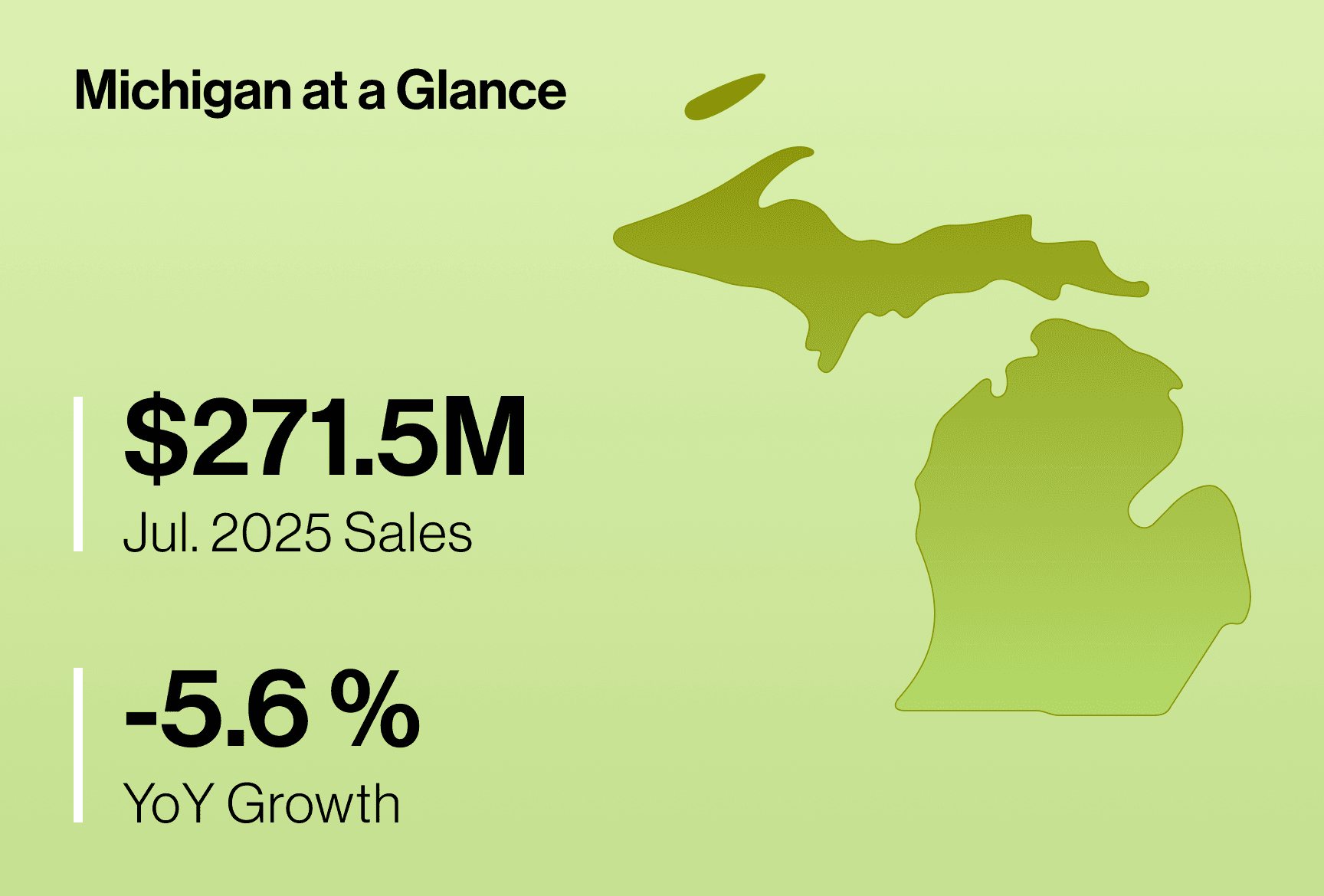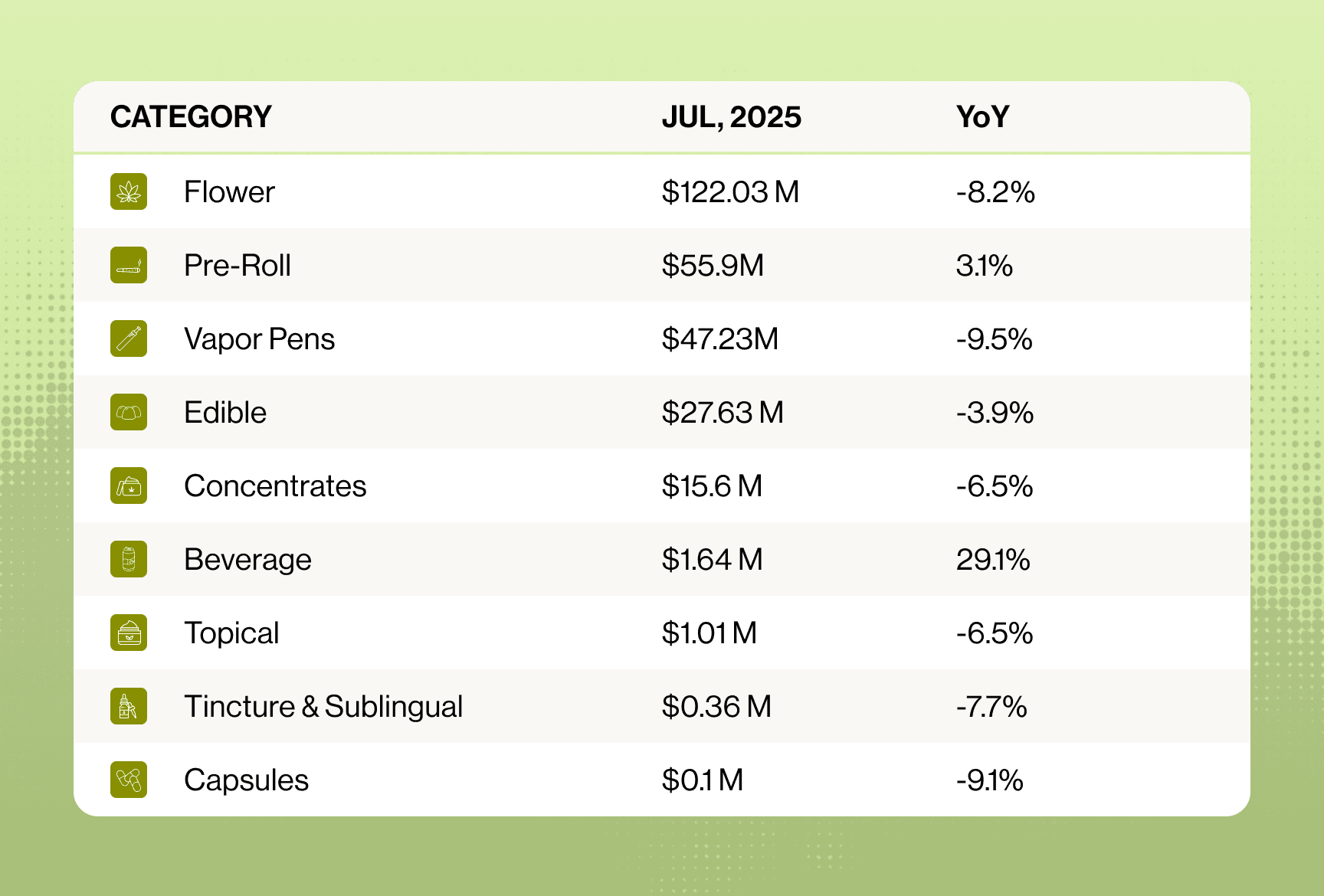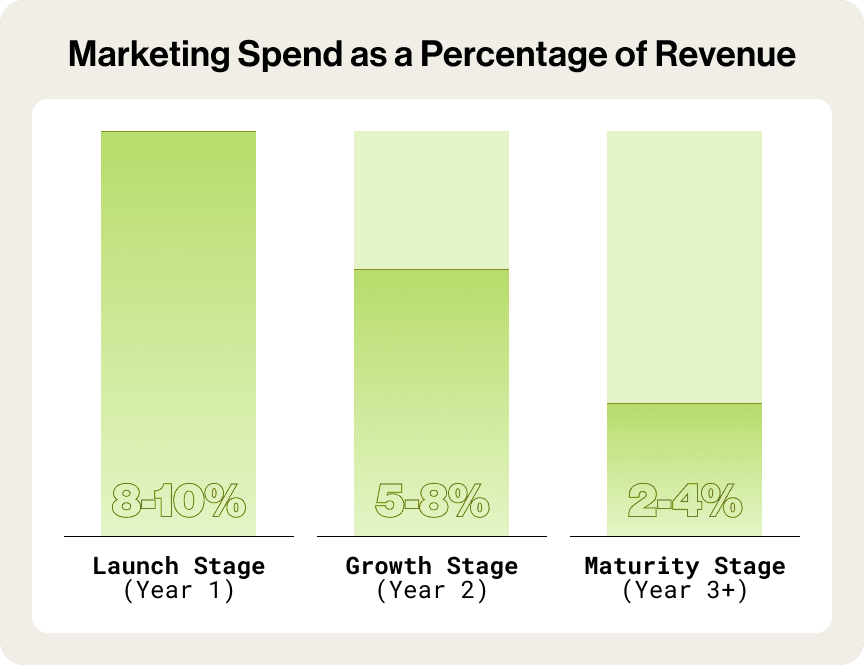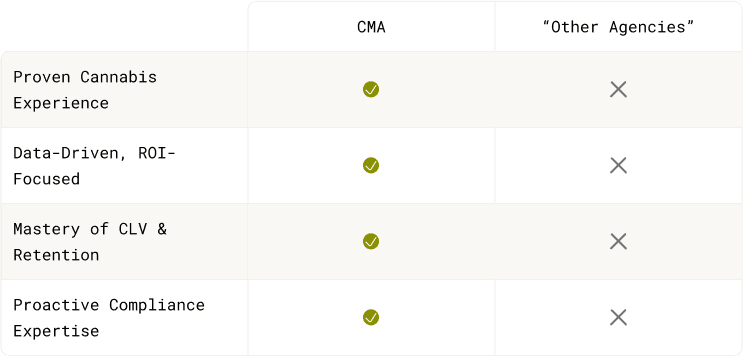How to Outmarket Your 600+ Michigan Dispensary Competitors
How to Outmarket Your 600+ Michigan Dispensary Competitors

Insights | 2025-01-16
Eric Allred - Head of Product

It's opening day. After months, maybe even years of getting past red tape, taking out a loan for your first inventory run, and locking down a bright, shiny new space, you've finally opened your dispensary doors in Michigan. But six months in, you're watching customers cruise past your store to visit the JARS location across town.
Your carefully curated products sit untouched while the multi-location chain down the street processes order after order through its drive-thru. Does this sound familiar?
This isn't a product quality or pricing problem; it's a marketing and positioning challenge that most Michigan dispensary owners face in one of the most competitive cannabis markets in America.
Michigan's cannabis market is a contrast study: explosive growth meets crushing competition, where rock-bottom prices create volume opportunities but razor-thin margins demand operational excellence. With over 600 dispensaries fighting for market share, simply opening your doors isn't guaranteed success.
But here's what we've learned from working with dozens of dispensaries nationwide: the ones that thrive aren't necessarily the biggest or well-funded. They're the ones that understand their customers and their local market and have created a clear, well-defined framework for what success looks like.
This guide will educate you on the basics of navigating Michigan's marketing regulations, the foundational components of building a cannabis marketing plan, how to implement your dispensary's marketing strategy, and how to build a clear, measurable framework for long-term growth.
Key Takeaways
- Identify the opportunities overlooked by larger chains by mastering Michigan's competitive dynamics.
- Develop marketing systems that drive volume and customer loyalty in a price-compressed environment.
- Partner with marketing-leading Michigan brands like Rythm, Wyld, and Jeeter to leverage their existing consumer demand to acquire new customers.
- Safeguard your business by thoroughly understanding Michigan's tax structure and Metrc compliance requirements.
- Create measurement frameworks that tie marketing activities to business outcomes and the income statement.
- Focus on community engagement and local differentiation to compete against multi-state operators.

Understanding the Michigan Cannabis Marketing Landscape
Working Within Michigan's Regulatory Framework
When Michigan launched adult-use cannabis sales in 2019, it created one of the most open licensing systems in the country. Unlike Ohio's and Illinois' restrictive approach, Michigan's framework prioritizes market access over market control.
This open-door policy created unprecedented opportunity and a flood of competition (currently over 600 dispensaries statewide). While barriers to entry remain lower than in most states, the sheer volume of competitors makes differentiation and customer acquisition more challenging than ever.
Michigan's advertising freedoms create strategic advantages.
Unlike many other states, Michigan allows cannabis advertising across multiple channels, but each campaign must navigate a specific set of compliance requirements.
You can advertise in adult-oriented publications, sponsor community events, and use targeted digital marketing approaches, provided you adhere to strict audience composition controls.
Michigan prohibits cartoon imagery, health claims, consumption depictions, and any content appealing to minors.
Dispensary owners are not allowed to market to the public unless the advertiser has reliable evidence that no more than 30% of the audience or readership is reasonably expected to be under 17 for advertisements under the MMFLA or 21 for products marketed under the MRTMA..
This 70% adult audience requirement reshapes your media strategy. Each ad must demonstrate that at least 70% of its audience is 21 or older; this effectively prohibits billboard advertising in high-traffic areas, broadcast television, radio, and most public transit advertising.
The Metrc tracking system impacts every promotional decision.
Michigan's mandatory seed-to-sale tracking provider, Metrc, significantly impacts your marketing operations and promotional engine.
Each product is tracked from seed to sale, and your inventory must align with your promotions. Effective integration between compliance tracking and marketing ensures accurate promotions. It allows you to build consumer trust by enabling easy access to detailed information about the products they purchase, including origin, cultivation methods, and testing results.
Tax implications influence customer perception.
Consumers in Michigan enjoy unparalleled transparency compared to most other markets. Michigan's 10% excise and 6% state sales tax are visible to customers, making transparent pricing communication essential for trust-building.

Competitive Landscape in Michigan
Michigan's cannabis market feels daunting at first glance.
The market's ease of access has led to over 600 licensed dispensaries. This excess supply has seen average item prices fall to $8.54 in June 2025, down from $8.90 in May 2025.
The market's volatility and price compression reward the prominent players with the deepest pockets; it's become a war of attrition.
Michigan's cannabis market is characterized by major chains dominating through scale and efficiency. House of Dank leveraged Detroit's cannabis culture to expand to 12 locations statewide. Lume Cannabis Co. operates 38 stores with aggressive loyalty programs and has achieved an unparalleled brand recognition across the state. JARS Cannabis maintains nearly 20 locations while cultivating a hip, community-focused atmosphere.
Despite this market saturation, independent operators who understand the nuances of their local markets can still seize unexpected opportunities.
Price compression breeds operational excellence.
Michigan's average item prices dropped 28% year-over-year, but unit sales increased 28.4%. This volume-price relationship creates opportunities for dispensaries that optimize operations, streamline the customer experience, and create loyalty programs that drive higher units per transaction and, ultimately, larger basket sizes.
Geographic border advantages exist for strategic operators.
Dispensaries like our client Happy Daze Cannabis have set up shop in New Buffalo and Port Huron, attracting out-of-state customers from Indiana and Ohio seeking Michigan's lower prices.
Brand partnerships provide an in-market opportunity.
Top-selling brands like STIIIZY, Wyld, Jeeter, Ozone, Simply Herb, and Rove have built near-permanent places amongst retailer shelves and within the greater consumer, cannabis zeitgeist. Dispensaries that secure strong relationships with these brands gain access to marketing support, exclusive products, and consumer recognition that a local, independent brand can't match.
Consumer Trends and Preferences in Michigan
To understand the Michigan cannabis consumer, we must look beyond price sensitivity to grasp the deeper motivations driving their choices in an oversaturated market.
Market conditions have trained Michigan shoppers to expect value but are not purely price-driven. The state's diverse demographic includes urban professionals, suburban families, rural communities, and cross-border visitors, each with distinct preferences and shopping behaviors.
Category trends reveal evolving consumption patterns.
While flower remains the largest category at $119.4 million monthly, pre-rolls have surged to $54.28 million, representing the fastest-growing segment. This growth reflects demand for convenience, portion control, and social consumption occasions that traditional flower doesn't address.
Though small at $1.51 million monthly, Beverages posted 31.3% year-over-year growth, signaling emerging mainstream acceptance. Vaporizers ($47.27 million) maintain strong performance among health-conscious consumers seeking precise dosing and discretion.
Demographic diversity creates multiple customer personas.
Millennials represent approximately 50% of Michigan cannabis customers, but adults over 41 account for 42% of total sales. This age diversity requires marketing approaches that speak to tech-savvy younger consumers and more traditional older adults who value education and personal service.
Brand loyalty exists but requires constant nurturing.
In Michigan's competitive environment, brand loyalty is earned through consistent quality, unique experiences, and ongoing engagement. Top-performing brands succeed by maintaining product consistency while continuously innovating and engaging customers through loyalty programs and community involvement.
Building Your Michigan Cannabis Marketing Plan
- Most dispensary marketing plans fail before they start. When we skip the foundational work and jump straight into tactics: social media, text campaigns, and loyalty programs; we enable a marketing culture that wastes money and prioritizes the illusion of activity without actual progress.
Establishing clear objectives and measurement frameworks allows us to hold marketing activities accountable and create a framework for prioritization. This allows us to focus our limited time and money on the channels that are moving the needle.
Setting Clear Objectives & Dispensary KPIs
Your marketing success depends on tracking the right metrics and understanding how they connect to your bottom line. We developed BNCHMRK, a dataset of key dispensary KPIs, to assist owners, operators, and marketing leaders in better understanding the efficacy of their marketing efforts by looking at a confluence of store-level, order-level, and loyalty-based metrics.
The nine key KPIs connect marketing activities with the income statement and help govern channel-related activity. By leveraging our proprietary BNCHMRK dataset, you can develop an understanding of how various channel-specific KPIs collectively contribute to broader, overall order—and store-level performance.
Store-Level Metrics
Store-level metrics focus on overall business health and performance:
- Marketing Efficiency Ratio (MER): Measures total revenue generated per marketing dollar spent.
- Acquisition Marketing Efficiency Ratio (aMER): Evaluates revenue specifically attributable to new customer acquisition relative to marketing spend.
Order-Level Metrics
Order-level metrics analyze individual customer transactions:
- Cost Per Order (CPO): Tracks marketing spend efficiency per transaction.
- Customer Return Rate: Highlights the proportion of customers making repeat purchases, indicating marketing's effectiveness in driving ongoing customer engagement.
Loyalty & Retention Metrics
Loyalty-based metrics evaluate customer retention and long-term value:
- Customer Review Rate: Indicates the percentage of customers leaving reviews, reflecting engagement and satisfaction.
- New Customer Review Rate: Specifically measures engagement among new customers.
- Loyalty Program Opt-In Rate: Measures how effectively customers enroll in loyalty programs.
- New Customer Loyalty Opt-In: Evaluates initial engagement by new customers with loyalty programs.
- Marketing Opt-In Rate: Assesses the success of customer consent to marketing communications, highlighting potential for ongoing relationship building.
Budgeting & Resource Allocation
Your marketing budget should reflect your dispensary's business stage, competitive landscape, and specific business objectives. Aligning your marketing spend with clear KPIs keeps marketing activities accountable and maximizes the marginal contribution of each marketing dollar spent.
Creating Your Dispensary's Marketing Budget
Creating an adequate marketing budget requires assessing three key factors:
- Business Stage: Are you launching, growing, or mature?
- Market Competitiveness: Is your dispensary in a densely competitive urban area or a more rural, less competitive market?
- Revenue Levels: Established dispensaries allocate around 1–2% of topline revenue to marketing. Newer dispensaries or those in competitive markets may need to allocate more.
Allocating Your Budget
Strategically distribute your budget to balance foundational growth with targeted expansion:
Foundational Channels
- Website & SEO (30–40%): Optimize for local searches, ensure intuitive navigation, and prioritize mobile responsiveness.
- Email & SMS Marketing (15–20%): Build an engaged subscriber list to drive repeat visits through personalized communication.
- Local Awareness (15–20%): Invest in local events, promotions, and community engagement.
Growth Channels
- Paid Advertising: Introduce targeted paid search, social media ads, and cannabis-specific platforms incrementally, scaling based on results.
- Loyalty & Retention: Expand loyalty programs, personalized incentives, and referral campaigns for high-ROI customer retention.

Budget Variations by Stage
Launch Stage (Year 1)
Marketing Spend: 8–10% of revenue
Focus on foundational efforts: website setup, SEO, initial customer acquisition, and establishing local brand presence.
Growth Stage (Year 2)
Marketing Spend: 5–8% of revenue
Expand paid advertising, increase SEO efforts, enhance content creation, and prioritize loyalty and retention programs.
Maturity Stage (Year 3+)
Marketing Spend: 2–4% of revenue
Refine loyalty initiatives, selectively leverage paid advertising, and focus on maximizing customer lifetime value. Aligning your marketing budget to your dispensary’s lifecycle and market realities ensures sustainable growth, optimized ROI, and lasting success.
Choosing Technology Vendors That Power Marketing Success
Your technology's interoperability determines your marketing execution capabilities and compliance adherence. Selecting the right POS system, CRM platform, and supporting tools creates the foundation for scalable, compliant, integrated marketing operations.
Selecting Your Online Menu & POS System
Your POS system should seamlessly integrate real-time inventory across in-store terminals, online menus, and third-party marketplaces (e.g., Leafly). Maintaining active product availability across these various customer touchpoints prevents “out-of-stock” disappointments and facilitates a growing consumer trust that products displayed as in-stock are what's available.
A modern POS should also provide detailed analytics on purchase history, best‑selling products, and peak shopping times, giving you data for more intelligent marketing decisions. As an Agency Plus partner, we are biased, and for good reason, towards Dutchie.
Choosing a Cannabis-Focused CRM
Beyond transaction processing, you need systems that understand cannabis consumer behavior patterns. Cannabis-focused CRMs like Springbig, Alpine IQ, or Happy Cabbage enable customer segmentation by purchase recency, frequency, and monetary value while supporting multi-channel communication across email, Push, text, and loyalty programs.
Integrating loyalty programs and automated rewards ensures you continuously incentivize, build repeat buyers, and recognize high‑value customers.
Integration & Compliance
Select vendors that interact seamlessly. Real-time synchronization between POS, CRM, and your online menu platforms will ensure accuracy across the various customer touchpoints. Built-in Metrc integration, age verification, and automated tax calculations will aim to reduce the administrative burden while keeping your compliance requirements in check.

Implementing Your Dispensary Marketing Strategy
Effective dispensary marketing requires orchestrating multiple channels to create seamless customer experiences that drive acquisition, conversion, and retention. Success (and profit) comes from optimizing each channel individually while ensuring they work cohesively.
Website Design & Development – Your Digital Storefront
- First impressions drive trust: Most consumers form opinions about your dispensary within seconds, and a strong design instantly converts visitors into customers.
- Mobile optimization matters: Over 70% of cannabis customers browse dispensary websites via mobile; fast-loading, seamless mobile experiences significantly boost conversions.
- Serve as a trusted guide: Your website should integrate real-time inventory, robust product details, and educational content, positioning your dispensary as your top salesperson.
- Optimized user journey: Minimize friction and help consumers find what they want when they want through intuitive navigation, accurate inventory updates, and clear calls to action.
Local SEO – How Customers Find You
- Visibility at the right moment: Most cannabis consumers visit dispensaries within 24 hours of an online search; ranking at the top locally translates to traffic, foot traffic, and ultimately sales.
- Optimized Google profiles: Information-rich, regularly maintained Google Business Profiles will attract more visitors and foster more consumer trust than standard listings.
- Reviews matter: Frequent positive online reviews improve search rankings and build credibility. Solicit feedback and respond professionally to demonstrate your commitment to customer satisfaction.
- Local content connects: Create and promote localized content highlighting local cannabis culture, events, and community involvement to capture "dispensary near me" searches.
Email & SMS Marketing – Bringing Back Regulars
- Turn visitors into subscribers: Incentivizing email and SMS sign-ups builds your list, a long-term asset, and significantly contributes to repeat visits and increases customer lifetime value.
- Segmentation drives sales: Group customers by purchase habits and preferences to personalize marketing and deliver personalized, relevant communications that outperform generic messaging.
- Automate to scale engagement: Maintain personal touchpoints through automated welcome series, re-engagement campaigns, and birthday rewards.
- Compliance handled seamlessly: Focus on customer relationships by leveraging marketing platforms with built-in age verification and regulatory compliance.
Paid Advertising – Amplifying Your Reach
- Multi-channel impact: Integrate campaigns across digital ads, community sponsorships, and local events to deliver substantially higher engagement than single-channel strategies.
- Target strategically: Use geographic, demographic, and behavioral targeting to reach compliant adult audiences.
- Community partnerships amplify reach: Collaborate with local organizations and events to expand your advertising influence.
- Track to optimize: Implement unique tracking methods, such as dedicated phone numbers and custom landing pages, to measure advertising effectiveness and continually refine your marketing spend.
Michigan Dispensary Marketing FAQs
Can dispensaries advertise in Michigan?
Yes, Michigan permits cannabis advertising through multiple channels with specific compliance requirements. You can advertise in adult-oriented publications, sponsor appropriate events, and use targeted digital marketing approaches. Every campaign must ensure at least 70% of the audience is 21 or older while avoiding content that appeals to minors, uses cartoon imagery, or makes health-related claims.
Are dispensaries in Michigan profitable?
Michigan dispensaries can achieve strong profitability despite intense competition, growing marketing saturation, and compressed pricing. Success is heavily predicated on operational efficiency, retaining an active customer base, and employing a volume-based business model.
How much does a dispensary owner in Michigan make?
Owner earnings vary widely based on store size, location, and operational efficiency. Michigan’s low average sale price and intense competition result in lower net profit margins than those of limited‑license states.
New stores will likely operate at razor-thin margins until they establish an active, loyal customer base. Larger, vertically integrated multi-store operators achieve higher profitability through economies of scale. While specific earnings data are private, successful operators often reinvest profits into new locations, improved technology, and marketing.

Working with Cannabis Marketing Professionals
Building effective dispensary marketing in Michigan requires specialized knowledge that general marketing agencies typically lack. The state's unique regulatory environment, competitive dynamics, and consumer behavior patterns create challenges that only cannabis-focused professionals can effectively address.
If you decide to work with a Michigan Cannabis Marketing Agency, here are a few things to remember.
- Prioritize proven cannabis experience. When evaluating potential partners, it’s essential to understand precisely what a cannabis marketing company does and whether it's worth the investment, ensuring you choose an agency aligned with your dispensary’s unique goals.
- Demand data-driven approaches. Your agency should focus on measurable results rather than vanity metrics, providing specific ROI examples and performance benchmarks from comparable dispensary clients.
- They should understand cannabis customer lifetime value, acquisition costs, and retention strategies specific to the industry.
- Ensure cultural alignment. Cultural alignment becomes crucial because cannabis marketing requires an authentic understanding of the community and customer mindset.
- Verify compliance processes. Comprehensive compliance processes should be built into every campaign and strategy. Your marketing agency should understand Illinois cannabis regulations better than you do, with systems and procedures that prevent violations before they occur rather than fixing problems after they happen.
Moving Forward with Marketing Your Michigan Dispensary
Michigan offers exceptional opportunities for dispensaries that combine strategic thinking with consistent execution.
Success requires a systematic marketing approach that fosters loyal customer relationships, facilitates repeat transactions, and prioritizes long-term profitability while overcoming short-term, downward pricing pressure.
Start with the fundamentals.
Clear objectives, appropriate technology selection, and integrated marketing across channels create the foundation for sustainable growth.
Success comes from consistent execution rather than perfect planning, so start with one channel, optimize its performance, and gradually expand your marketing efforts.
Identify your biggest opportunity.
Your primary marketing challenge likely falls into one of three categories: building initial awareness in a saturated market loaded with deep-pocket incumbents, turning online browsers into in-store customers, or transforming one-time purchasers into weekly regulars.
Identifying your challenge helps prioritize activities and create measurement frameworks that track progress.
Build adaptable, data-driven systems.
Dispensaries that create flexible, data-driven marketing systems successfully adapt to changing regulations, evolving technologies, and shifting consumer preferences. The Michigan market rewards operators who use data to make decisions rather than relying on intuition or copying competitors.
Whether you're struggling with customer acquisition costs, retention challenges, or competition from larger retail footprints, the solution remains consistent: strategic planning, systematic execution, and relentless focus on the customer experience.
Michigan's $2 billion cannabis market offers tremendous opportunity, but only to dispensaries that move beyond planning and take decisive, strategic action.
The opportunity is there; it's time to execute.
About The Cannabis Marketing Agency
The Cannabis Marketing Agency: Cannabis marketing experts making your dispensary the one everyone talks about (in a good way).
We make your dispensary the local favorite — the spot people talk about, shop at, and keep coming back to.
+4 Years Growing Dispensaries: We don't "learn on your dime".
Trusted by Dispensaries in 18 Markets: From Cali to Mass, if it’s legal, we’ll help you win.
For DIYers who hate learning the hard way.
Want More Dispensary Customers?
We grow dispensaries like it’s our day job (because it is). Ever wonder what we’d do for yours? Let’s find out.
Get Started